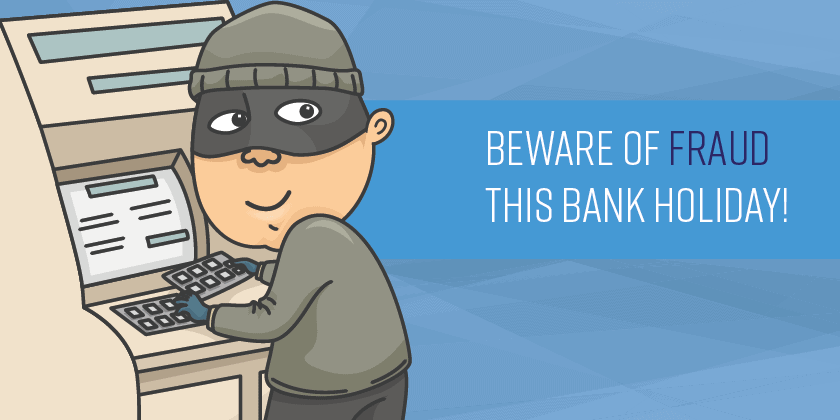Everyone looks forward to holidays, even that one extra bank holiday day that seems to make all the difference to the weekend. Making the most of our time off work by spending (probably more than we should) when we’re out and about is all part of the fun. However, this is also a fun time for fraudsters, as they find this a perfect opportunity to scam and steal from people during this busier time.
Holiday scams don’t only exist when you go abroad, they happen on bank holidays too and can occur in the comfort of your own home. Cybercriminals will be gearing up to scam consumers, leveraging digital devices, social media platforms and mobile apps this May bank holiday. With the banks being closed, they know they can take advantage of the increased email and text notifications around this period.
Thieves drain our bank accounts of more than £300 million every year! There are many ways they do it – from using cards or card details to order items in shops, on the phone or internet, to even stealing your identity and taking over your entire account.
We don’t want you to lose any money or be a victim of fraud this May bank holiday weekend so here are a few things to be cautious of:
Smishing

Beware of smishing. This is when fraudsters pretend to be your bank via a text message on your mobile phone. The message may appear to be your bank asking for details regarding your account, but there could be a criminal on the other end.
Simple solutions:
- Always double check if you’re unsure, or wait until your bank opens on Tuesday to seek advice from them.
ATM Skimming

During the bank holiday weekend, you need cash and are probably in a rush to get it. Criminals can access your information at ATMs by installing skimming devices to steal the data off your card’s magnetic strip and either use a video camera or keypad overlay to capture your PIN.
Simple solutions:
- Look carefully at your ATM for anything suspicious and cover the keypad when entering your PIN.
- When withdrawing money, be aware of your surroundings. Check to make sure that you’re in a safe place when entering your information.
Online bookings

If you’re going to make the most of the bank holiday weekend by going on a trip, then take all precautions when booking hotels and travel online.
One of the most common types of fraud is related to holiday accommodation, in which fraudsters set up fake websites and post fake ads online, as well as fake airline offers.
Simple solutions:
- Use common sense. Use your instincts; if something sounds too good to be true, it probably is.
- Check the web address is legitimate and has not been altered by slight changes to a domain name, such as going from.co.uk to .org.
- Do your research. Don’t just rely on one review – do a thorough online search to check the company’s credentials. If a company is defrauding people there is a good chance that consumers will post details of their experiences, and warnings about the company.
- Never pay directly into an owner’s bank account. Paying by direct bank transfer is like paying by cash – the money is very difficult to trace and is not refundable. Wherever possible, pay by credit card (or a debit card that offers protection).
Bank carefully

Bank carefully even when your bank is closed. People spend more money during the holidays than they do all year.
Simple solutions:
- If your bank calls requesting information, hang up, wait ten minutes, then call them back t
- hrough the official main phone number.
- Ensure devices are secured with complex passcodes to allow access to smartphones, tablets or laptops.
What happens if you’re a victim of fraud?
Report it to Action Fraud at www.actionfraud.police.uk or speak to a specialist advisor on 0300 123 2040. You can also use the online tool if you suspect you’ve been targeted.
You can also visit Crimestoppers at www.crimestoppers-uk.org







